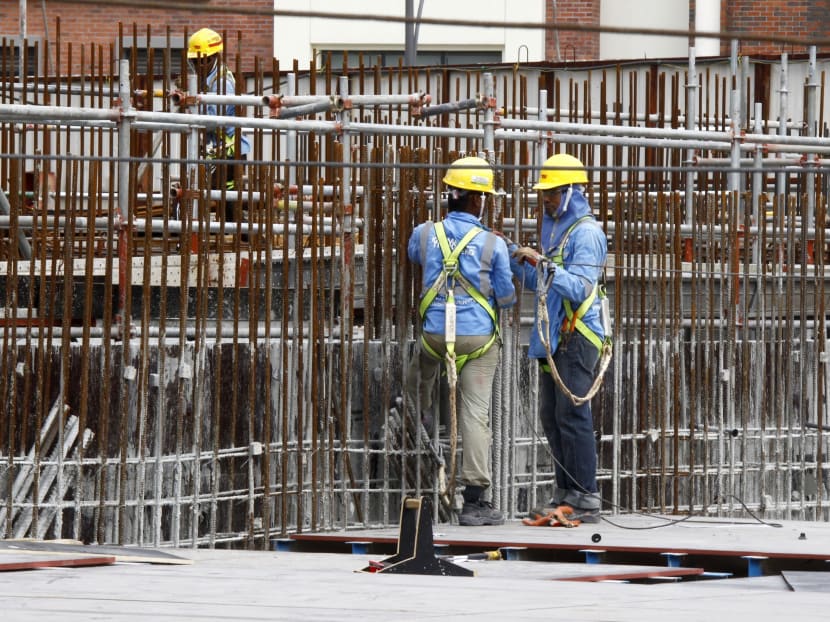Migrant workers unfamiliar with work injury claims options, say observers
SINGAPORE — The Manpower Ministry (MOM) can help to raise awareness among foreign workers of work injury compensation claims, said advocacy group Transient Workers Count Too (TWC2) as it called out some questionable practices by law firms it has observed.
SINGAPORE — The Manpower Ministry (MOM) can help to raise awareness among foreign workers of work injury compensation claims, said advocacy group Transient Workers Count Too (TWC2) as it called out some questionable practices by law firms it has observed.
For instance, the ministry could set up a stall at carparks in Little India, which are often used for commercial stalls and service providers, suggested TWC2 executive committee member Debbie Fordyce.
MOM personnel at the stall could instruct foreign workers about work injury compensation claims and help with discharging their lawyers, she wrote in a Nov 12 article about some law firms’ practices in cases involving injured foreign workers.
The article was removed from TWC2’s website on Wednesday night (Nov 29) over content that the Law Society of Singapore deemed defamatory to the firms named.
In its response to TODAY, the MOM did not comment on TWC2’s suggestion.
It said workers should “consider carefully” between claiming under the Work Injury Compensation Act (Wica) and filing a suit under common law, “as the evidential requirements are different”.
“As a no-fault regime, Wica allows workers to make claims for work-related injuries without having to take legal action. A claim is admissible as long as the injury arose out of and in the course of employment. The worker need not prove fault or negligence on anyone’s part,” said Ms Kee Ee Wah, director of the MOM’s Work Injury Compensation Department.
Under the Wica, local and foreign employees who have sustained injuries or occupational diseases at work, or as a result of work, can file a claim with the MOM for medical expenses, medical leave wages, or a lump sum compensation for permanent incapacity or death.
Compensation amounts under Wica are calculated based on a formula and have fixed limits. The claim ceiling for medical expenses, for instance, is S$36,000 or one year’s medical expenses from the date of the accident, whichever is lower.
Engaging a lawyer is optional in this process, according to the MOM’s website.
Wica does not cover independent contractors, self-employed workers, domestic workers and uniformed personnel.
Alternatively, injured workers may choose to launch a civil suit, which may lead to higher compensation amounts. Workers who opt for this will need to engage a lawyer and prove that their employer, or a third party, was at fault.
Injured workers can seek compensation through either the Wica or common law, but not both.
Workers can re-apply for a claim under Wica after they lose their law suits, so long as the claim is filed within a year from the accident.
Workers should seek legal assistance if they are seeking damages “substantially higher” than what Wica can offer, said lawyer Alfred Lim, who handles cases relating to workplace health and safety.
Anecdotes of law firms taking a cut of injured workers’ compensation have “been around for some time” although such practices are “strictly not allowed”, he said.
“My view is that lawyers should not bill based on a percentage of the damages awarded. Lawyers typically bill based on time spent or offer a fee cap for uncomplicated matters. It should not be different for workmen injury cases,” said Mr Lim, a director with Quahe Woo & Palmer.
“Perhaps it is more equitable to agree on a reasonable fee cap for legal services rendered, with the amount paid from the damages and compensation awarded.”
Some Bangladeshi workers find it “more convenient” to engage lawyers even for Wica claims because they are unfamiliar with the processes, or have been repatriated and are unable to attend meetings with the MOM, said Mr AKM Mohsin, who runs Dibashram, a drop-in centre for migrant workers.
“Many law firms engage Bangladeshi guys to look out for these workers, offer to help them, and forge a sense of brotherhood. But some workers end up being exploited as a result,” said Mr Mohsin.
For instance, some lawyers persuade workers to drop their Wica claims and file a civil suit instead, he said.
According to the MOM, about 800 injured workers withdraw their Wica claims each year to pursue them in court. The ministry does not track the outcome of these court cases.
The Archdiocesan Commission for the Pastoral Care of Migrants and Itinerant People said foreign workers are sometimes “poorly informed about costs” involved in legal proceses.
“Generally, our case management team (assists them) through the (claimants) process and use our own pool of lawyers, thereby avoiding a situation where the clients deal with the legal firms themselves,” said Mr Thomas Tay, who handles advocacy and research for the religious group.
The MOM recently announced from the second half of next year, all non-Malaysian foreigners here on work permit will have to attend a mandatory Settling-in Programme that will help them understand, among other things, their employment rights and obligations, laws, and social norms in Singapore. Currently, only foreign domestic workers are required to undergo the programme.










